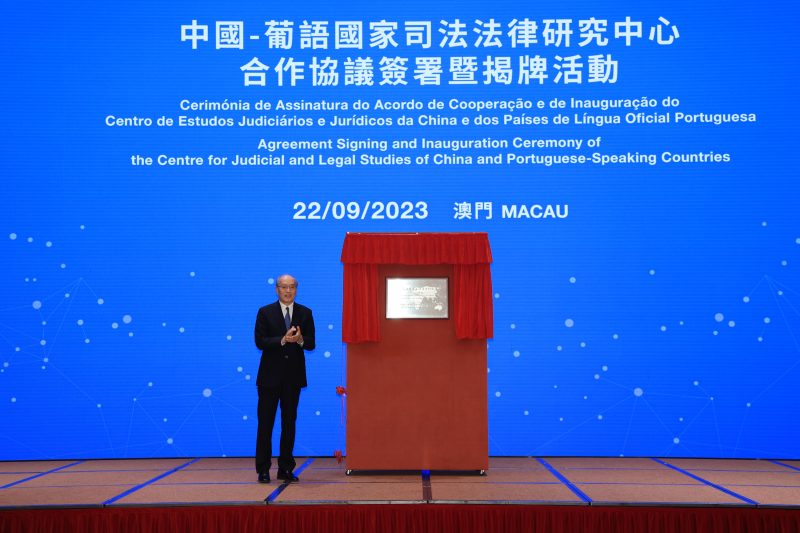News Express: UM, Supreme People’s Court jointly establish Centre for Judicial and Legal Studies of China and Portuguese-Speaking Countries
新聞快訊:澳大與最高人民法院共設中國—葡語國家司法法律研究中心

揭牌儀式
The inauguration ceremony
澳大與最高人民法院共設中國—葡語國家司法法律研究中心
澳門大學與最高人民法院合作設立中國—葡語國家司法法律研究中心,並於今(22)日舉行合作協議簽署暨揭牌活動。此外,雙方還就中國與葡語國家司法交流的現狀及發展願景、內地與澳門司法法律交流合作等方面交換意見,期望進一步深化合作。
最高人民法院院長張軍、最高人民法院分管日常工作的副院長鄧修明、澳門特別行政區政府行政法務司司長張永春、最高人民法院副院長楊萬明、廣東省高級人民法院院長張海波等出席活動。澳大校長宋永華致辭時表示,在大力推進“一帶一路”戰略的背景下,中國與葡語國家往來更加密切,彼此之間的司法合作需求不斷增大,建立不同司法體系間的合作交流平台恰逢其時。中國—葡語國家司法法律研究中心的成立,象徵著中國與葡語國家在友好交往和緊密合作中取得了新的重要成果,不僅提供了一個嶄新的互動平台,同時也體現了新時期國際交流與合作的新方向。該中心的創建,將為各國經濟繁榮發展、推動構建人類命運共同體提供更全面、更公正、更透明的司法服務保障,還有助於促進各方司法工作進步乃至世界法治文明建設。
最高人民法院研究室主任段農根與澳大法學院院長唐曉晴代表雙方簽署合作協議。雙方期望以合作協議的簽署為契機,共同推進更深層次、更廣領域、更高水平務實合作,充分發揮各自優勢,讓合作成果更豐碩。
張軍為中國—葡語國家司法法律研究中心揭牌,標誌著中國—葡語國家司法法律研究中心正式開啟高質量發展的新征程。該中心採取最高人民法院和澳大共建模式,接受最高人民法院研究室和國際合作局在發展方向和發展戰略上的業務指導,澳大法學院負責日常運行,並由唐曉晴擔任中國—葡語國家司法法律研究中心主任。該中心現階段的主要工作包括研究和推介習近平法治思想,開展中國與葡語國家法律研究,培養國際複合型法律人才,開展域外法律查明研究合作,中葡法律和案例資料庫和法律動態信息庫建設等。
其後,雙方圍繞中心建設及未來發展、內地與澳門司法法律合作交流展開進一步討論。中國—葡語國家司法法律研究中心成立暨調研座談會由宋永華主持,會上唐曉晴介紹了該中心的成立情況及年度工作計劃;中國—葡語國家經貿合作論壇(澳門)副秘書長贊東介紹了中國與葡語國家經貿往來情況、文化差異及法律交流合作能為雙方帶來的好處。雙方也就兩法域之間的司法法律交流情況進行了探討,張永春和楊萬明分別介紹了相關情況。
張軍總結講話指出,研究中心的建立是最高人民法院和澳門特別行政區深入貫徹落實習近平總書記關於港澳工作的重要論述,服務保障粵港澳大灣區建設,助力澳門發揮在中國和葡語國家之間橋樑紐帶作用的重要舉措。張軍希望研究中心在推進粵澳規則銜接上精準發力,持續豐富“一國兩制”實踐,為澳門長期繁榮穩定提供新動能,為祖國高水平對外開放提供有力服務。
另外,最高人民法院代表團亦在張永春及澳大法學院人員的陪同下參觀了澳大。期間,澳大代表介紹了澳大的歷史沿革和發展概況。
欲瀏覽官網版可登入以下連結:
https://www.um.edu.mo/zh-hant/news-and-press-releases/presss-release/detail/56599/
UM, Supreme People’s Court jointly establish Centre for Judicial and Legal Studies of China and Portuguese-Speaking Countries
The University of Macau (UM) and the Supreme People’s Court of the People’s Republic of China today (22 September) held the agreement signing and inauguration ceremony for the Centre for Judicial and Legal Studies of China and Portuguese-Speaking Countries jointly established by both parties. The two parties also exchanged views on the current status and prospects of judicial exchanges between China and Portuguese-speaking countries, as well as on judicial and legal exchanges and cooperation between mainland China and Macao, with a view to strengthening cooperation.
Guests attending the event included Zhang Jun, president and chief justice of the Supreme People’s Court; Deng Xiuming, vice-president (daily operation) of the Supreme People’s Court; Cheong Weng Chon, secretary for administration and justice of the Macao SAR; Yang Wanming, vice-president of the Supreme People’s Court; and Zhang Haibo, president of the High People’s Court of Guangdong Province. Yonghua Song, rector of UM, said in his speech that in the context of the Belt and Road Initiative, China’s close ties with Portuguese-speaking countries have resulted in increased demand for judicial cooperation between the two sides. The establishment of the centre is timely, providing a platform for cooperation and exchanges between different judicial systems. It is also an important outcome of the friendly exchanges and close cooperation between China and Portuguese-speaking countries. The centre not only provides a new platform for interaction but also embodies the new direction of international exchanges and cooperation in the new era. It will provide more comprehensive, equitable, and transparent judicial services for economic prosperity and the building of a common destiny for mankind, thereby facilitating the advancement of judicial work of all parties and the civilisation of the rule of law across the globe.
Duan Nonggen, director of the Research Office of the Supreme People’s Court, and Tong Io Cheng, dean of UM’s Faculty of Law, signed a cooperation agreement on behalf of the two parties. They hope to take the signing of the cooperation agreement as an opportunity to foster deeper, broader, and higher-level cooperation, and to give full play of their respective strengths and yield fruitful outcomes.
The inauguration ceremony was officiated by Zhang Jun, marking a new journey of high-quality development for the Centre for Judicial and Legal Studies of China and Portuguese-Speaking Countries. The centre is jointly established by the Supreme People’s Court and UM, with the Research Office and the Bureau of International Cooperation of the Supreme People’s Court providing guidance on its development direction and strategy, and the Faculty of Law of UM in charge of its daily operations. The centre’s current main tasks include the research and promotion of Xi Jinping’s Thought on the Rule of Law, conducting legal research on China and Portuguese-speaking countries, cultivating international and multi-disciplinary legal talent, facilitating cooperation in the ascertainment of foreign law, and creating databases of Chinese and Portuguese laws, cases, and legal information.
After the inauguration ceremony, the two parties had discussions on the future development of the centre, as well as on judicial and legal cooperation and exchanges between mainland China and Macao. Rector Yonghua Song presided over a seminar on the establishment and research of the centre, during which Prof Tong Io Cheng discussed the centre’s establishment and presented its annual work plan. Paulo Jorge Rodrigues do Espírito Santo, deputy secretary-general of the Permanent Secretariat of the Forum for Economic and Trade Cooperation between China and Portuguese-speaking Countries (Macao), addressed the economic and trade relations and cultural differences between China and Portuguese-speaking countries, and highlighted the benefits that legal exchanges and cooperation can bring to both sides. The two parties also discussed the judicial and legal exchanges between the two jurisdictions, with Cheong Weng Chon and Yang Wanming presenting the relevant information.
Zhang Jun said in his concluding remarks that the establishment of the centre is an important initiative for the Supreme People’s Court and the Macao SAR to thoroughly implement the important remarks made by General Secretary Xi Jinping on Hong Kong and Macao affairs, to contribute to the development of the Guangdong-Hong Kong-Macao Greater Bay Area, and to help Macao play the role of a bridge between China and Portuguese-speaking countries. He also expressed hope that the centre will focus on promoting the legal regulatory interface in Guangdong and Macao and continue to implement the ‘One Country, Two Systems’ policy, so as to give new impetus to Macao’s long-term prosperity and stability and provide strong support for the high-level opening-up of the country.
In addition, the delegation from the Supreme People’s Court visited UM, accompanied by Cheong Weng Chon and members of UM’s Faculty of Law. During the visit, UM representatives presented the history and development of the university.
To read the news on UM’s official website, please visit the following link:
https://www.um.edu.mo/news-and-press-releases/press-release/detail/56599/